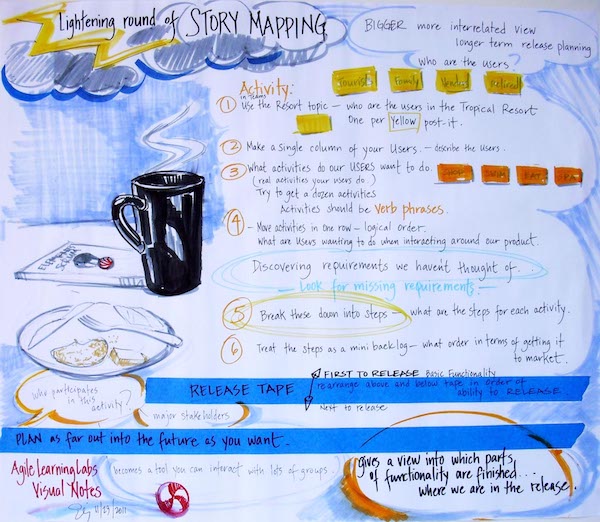In this module, we create a lightweight document that can define, align, and get a project started.
A micro-charter, sometimes called a one-pager, is a brief document that identifies key aspects of a project. A project is born as an idea; the micro-charter is a way to capture that idea efficiently. Once captured, the idea becomes easier to share, discuss, and refine. The likelihood that a business document will be read goes down as the length of the document goes up. For this reason, the micro-charter is kept brief.
A chalk talk about the state-of-the-art with regards to applying Scrum in large organizations. In our Certified ScrumMaster and Certified Scrum Product Owner trainings, this module is delivered by Jeff McKenna, one of Scrum’s co-founders and a member of the very first Scrum team.
Successful products address needs that exist for a market segment. For many, a market segment is a fairly abstract concept. User personas put a human face on a market segment. They help us understand and empathize with the people for whom we build our products. They build alignment and shared understanding between business people and technical people. In this session, you will create user personas to create and refine a shared understanding of the people who are your product’s market segments.
SWOT analysis is a tool commonly taught in business school to examine internal strengths and weaknesses as well as external opportunities and threats. It was originally conceived to help corporations formulate high-level business strategy, but it has proven useful in a broad range of situations. SWOT is an excellent tool for evaluating business opportunities such as starting a new business, entering a new market, pursuing a new development project, or allocating resources in areas such as recruiting or training.
This workshop will teach you how to do a basic SWOT analysis, using your career or your company’s business as a practical application. You will learn a valuable analytic tool and gain insight into your own career or company.
A product backlog indicates what to build, but not why we should build those things, or how they are interrelated. Story mapping builds a deeper understanding of our stakeholders’ needs and how we can best meet those needs. It is also a great tool for uncovering dependencies and bad assumptions. In this hands-on session you will practice creating a story map and exploring its uses.

Self-organizing teams are 10,000% more effective, make people happy, and will save the world! At least that’s what some Agile and Lean advocates seem to suggest. Have you ever had the experience of being on such a team? In this experiential workshop you will.
Teams will form, solve problems, optimize systems, and learn-by-doing:
- Form a team.
- Create your own process.
- Execute.
- Repeat.
The lessons in this fast-paced, unscripted learning lab will come out of your experience, not off of a PowerPoint slide. Worry not! We promise there will be no “trust falls”, ropes course, or singing.
Retrospectives are a scrum team’s most powerful tool for facilitating continuous improvement. We’ve all encountered teams making the same mistakes and suffering the same pain over and over again. The good news is that it’s possible to break this cycle by investing as little as one hour per week in a sprint retrospective. In this session, you will learn the basics of how to facilitate a retrospective; how to attend one; and how to use retrospectives to put your team on a path of continuous improvement.
… Without Groupthink!
A group may have vast experience, a variety of viewpoints, and impressive intellectual horsepower. It may also have politics, personality clashes, and other more subtle dynamics that get in the way of optimal group problem solving, idea generation, and decision-making. This workshop teaches a technique for harnessing the wisdom of the group, while avoiding many of the pitfalls that plague standard brainstorming-based approaches.
The Group Wisdom Without Groupthink process begins with the Nominal Group Technique (NGT), which allows a group to quickly build a comprehensive list of ideas, issues, options or solutions. NGT works faster than traditional brainstorming, yet generates more complete and higher quality results.
The list of possibilities generated by NGT is then narrowed down to identify the best or most important ideas using DOTS, a form of dot voting. DOTS engages the collective wisdom of the group, while avoiding groupthink and politics. When faced with a choice between a variety of options, this technique facilitates a group decision that will have the broadest support.
This workshop will teach you how to use the Group Wisdom Without Groupthink process by applying it to an issue such as “What makes agile projects succeed (or fail)?”, or some other question of interest to your group.
Agile is a holistic approach to software development that grew out of the experience and insight of people working in the field. It follows then, that the best way to learn about agile is to experience it. Over the course of this short workshop, which is popular as a stand-alone presentation to user groups and at conferences, we will engage the power of simulations and learning games to evoke and explore various aspects of the Agile experience. Warning! This will be a participatory learning experience, without a PowerPoint safety net!
Areas we will explore will include:
- The power of iterative development and delivery
- Team self-organization
- Directive vs. Participatory project management approaches
- Agile techniques for continuous improvement
- Communication on an agile team
“How long will that take?”
A simple question, yet one of the hardest to answer. You will learn why traditional estimation fails to provide satisfying results. We will uncover how and why relative estimation leads to better predictability. You will learn and practice the Easy Estimation With Story Points technique, which has helped hundreds of teams provide better predictability while spending less time estimating.



